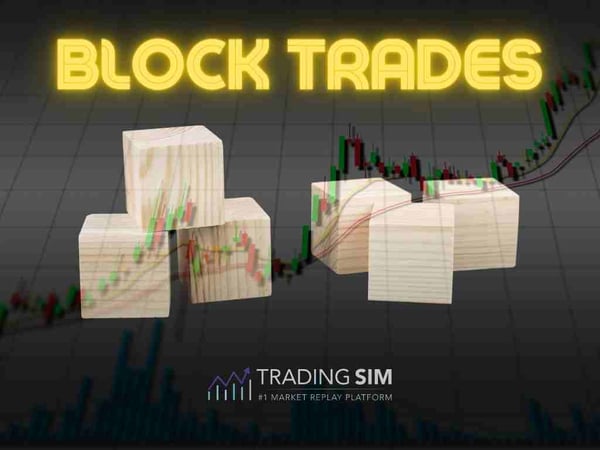A block trade is a large-sized stock order that takes place outside of the publicly traded stock market. By the definition of the NYSE and NASDAQ exchanges, a block trade is a trade of more than 10,000 shares or with a value of more than $200,000. Block trades are carried out by institutional investors and are held on private exchanges because they would have a direct impact on the stock’s price.
Why do block trades exist?
It is the easiest way for institutions to make a bulk-sized trade of a stock without having a direct impact on the stock market. Major investors like hedge funds or pension funds often buy or sell hundreds of thousands or even millions of shares at a time. One block trade could potentially be the equivalent of the total daily trading volume for the stock.
It is usually to the benefit of retail investors that institutions have the ability to make block trades on a private exchange. These are usually called block houses, which are special departments at brokerages that handle these large-sized trades. You might have heard of dark pools, which are the private exchanges where block trades take place outside of the public eye. The existence of dark pools has been a contentious debate, particularly amongst retail traders who were involved in the meme stock short squeezes.
What do block trades mean for stocks?
Block trades do not mean much for the stock and how we see it on the publicly traded markets. Just think of block trades as regular trades that are too large to be carried out on the public exchanges. We shouldn’t think of block trades as market manipulation or shady tactics by hedge funds. With that being said, block trades do provide valuable data for how big money is trading their portfolio.
Typically, depending on the liquidity of a stock, a block trade doesn't not have an immediate impact on volatility. However, large orders are noticed by many market participants who take an interest in stocks when large institutions could be taking a stake. Usually, this doesn't impact day trading as much, unless the block order occurs at a certain inflection point in a trading strategy.
Are block trades buy or sell?
Block trades can be either a buy or a sell order. It doesn’t really matter if it is a buy or sell, as the block trade itself may not have any immediate impact on the stock’s price. Still, some investors watch for block trades and dark pool data for an indication of how institutional investors are feeling about certain stocks. It gets a little bit more complicated when you talk about block trades and options flow. Dark pool data actually does not reveal if a trade is a buy or sell, so traders are left to come to their own conclusions.
Are block trades bullish?
Not particularly. Since block trades can be either a buy or sell order, the existence of a block trade in itself is not specifically bullish. Reading dark pool data can provide an insight into funds being bullish on certain stocks. But for the most part, just because an institution is making a block trade it doesn’t mean it is bullish or bearish. It is up to the investor or trader to take a bigger picture approach to the volume and price analysis in a stock before deciding if a large volume day, perhaps with block trades, is bullish or bearish.
How are block trades reported?
There are fairly strict reporting regulations for block trades that are imposed by the exchanges themselves as well as FINRA. Typically, block trades are required to be reported within ten seconds of the trade going through. FINRA also publishes the data, but if you want a real-time indicator there are plenty of stock screeners and even options flow software that will provide block trade and dark pool data.
What is a block trade in futures?
Block trades do not exclusively pertain to equities trades. They can also be trades of bonds, options contracts, and even futures contracts as well. Just like you would imagine a futures contract trade, a block trade in futures is just a massive, outsized version of this. As with individual stock block trades, futures contract block trades have no material impact on the state of the stock market.
Block Trade Summary
While some believe that block trades and dark pools are a hedge fund’s way of hiding their trades, this simply isn’t true. Block trades exist so that institutions can carry out large, oversized trades of stocks, bonds, options, or futures, without having a direct impact on the markets. They are necessary and a benefit to retail traders. Block trades aren’t bullish or bearish, but do provide valuable data that shows how big traders feel about a given asset.







 Day Trading Indicators
Day Trading Indicators 
